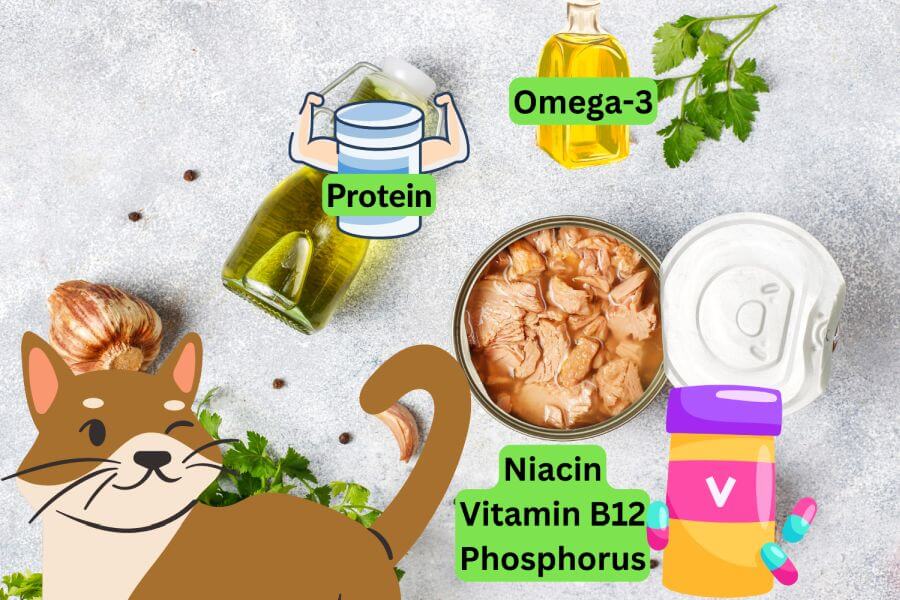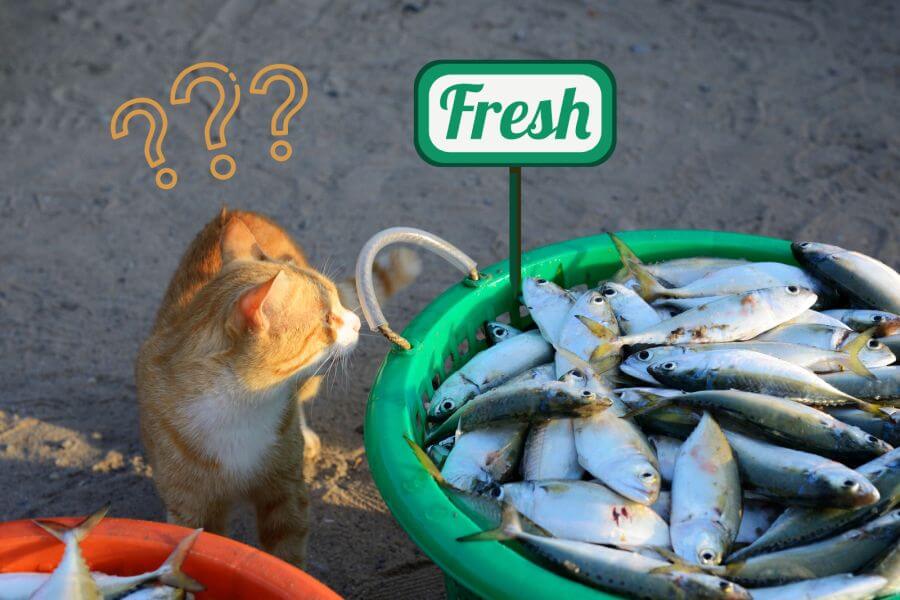Long Story Short
- Surprisingly, feeding tuna to cats isn’t always a good choice 🤔
- Tuna is a treasure chest of nutrients. We’re talking protein, omega-3 fatty acids, niacin, and phosphorus! ✔️
- The dark side of tuna is mercury poisoning. You don’t have to worry about it in commercial cat food. But if you feed your cat raw tuna, we recommend keeping a close eye. ⚠️
- Freshly cooked or tinned tuna (in water) is the best way to go ✔️
Tuna is a red meat fish that inhabits both fresh and salt water all over the world (a fish equivalent of chicken). It’s a common food for humans and cats alike. In fact, tuna is one of the most popular fish foods for cats. But can cats eat tuna 100% safely?
Health Benefits of Tuna for Cats

- Tuna: the dynamite powerhouse of protein! The bounty of protein it offers aids in crafting and preserving the robust muscles that your feline friend needs. For tiny kittens on their journey to grow, tuna offers a whopping 30% of protein – a pivotal ingredient for their development. But let’s not forget our adult cats – they still need a generous 26% crude protein to stay in shape. So, remember this when you’re in search of the purrfect cat food!
- Not just a protein superstar, tuna also brings the gift of Omega-3 fatty acids to the table. The omega-3 present in tuna is like a soothing balm for your cat’s coat and skin, and it even moonlights as an inflammation warrior, helping to quell those fiery flare-ups.
- Enter niacin: the unsung hero found in tuna. This water-soluble vitamin is an absolute must-have for your feline. It not only acts as a fuel converter, transforming food into much-needed energy, but also champions the smooth running of the nervous and digestive systems. Beware of niacin deficiency, though, as it can bring about unwanted skin issues, hair loss, and a dip in your cat’s appetite.
- Did you know that tuna also houses Vitamin B12, another water-soluble ally? This vital vitamin wears many hats—it aids in the creation of red blood cells, acts as a guardian for your cat’s nervous system, and keeps lethargy, poor appetite, weight loss, and neurological problems at bay.
- And let’s not forget about the phosphorus, an abundant treasure found in tuna. Phosphorus propels your cat’s growth, ensures the fine-tuning of their muscles, and also lends a helping hand to the body’s enzymes. A phosphorus-deficient diet can make your cat sluggish, impair their digestion, and make them vulnerable to diseases. So, let’s raise a paw for this essential nutrient!
Risks of Giving Your Cat Tuna
Since it’s so healthy, can cats eat tuna? Yes, but proceed with caution! Here’s why moderation is key and why tuna should be an occasional treat rather than a staple.
The Mercury Menace
Despite its nutritional prowess, tuna carries a hidden danger – mercury. This toxic heavy metal is as much a threat to your cat as it is to you. Over time, it may stealthily accumulate in the body, dealing devastating blows to the kidneys and nerves, and could even usher in the grim reaper.
Especially carnivorous fish, like tuna, have a higher mercury content because they accumulate it from their prey. Beware, bigeye tuna is the most notorious for this, while the safer bet would be light or skipjack tuna.
The Paradox of Vitamin E Deficiency
Tuna teems with unsaturated fatty acids – a health boon, you might think. Well, it’s not all sunshine and rainbows. Excess consumption could lead your feline friend down a perilous path to vitamin E deficiency, which gives rise to a condition known as yellow fat disease. The tell-tale signs are:
- a coat that loses its shine and turns greasy;
- extremely sensitive skin that reacts to the slightest touch;
- unusual lumps on or underneath the skin;
- persistent fever;
- a sudden bout of depression;
- a dwindling appetite;
- a peculiar reluctance to move around.
If these symptoms ring a bell, and your cat has been indulging in a tuna banquet of late, you might want to get them checked for yellow fat disease. The healing process usually involves halting the tuna intake and supplementing with medications to cleanse the liver. Rest assured, once the vitamin E levels return to normal, your feline companion is likely to bounce back to their original vigor.
Editor’s Note
Vitamin E deficiency also happens in pets who are given omega-3 supplements that aren’t balanced out with the vitamin. For example, there was a viral story written by a woman who “almost killed her dog with fish oil.” Perhaps giving your cat a little extra vitamin E with their tuna treats is a good idea.
Which Type of Tuna Is Best for Your Cat? Fresh or Canned Tuna?
One last thing to consider is the type of tuna you’re serving your cat. You can choose from 3 options: raw tuna, tuna in water, and in oil. Can cats eat tuna in all these forms?

- Raw, aka fresh, tuna is the most natural form of tuna, and naturally the best option of them all. There is just a tiny, little catch – bacteria. Let’s say you bought tuna from some fishy looking stand. Chances are tuna wasn’t stored properly, and so, it can contain harmful bacteria.
- Canned tuna in oil is the one we think of when we hear “cat eats tuna.” It’s a fine choice (cats love both fish and oil). In this case, you just have to portion the fish properly. Your cat may become a little chonky with a lot of oil in her diet.
- Canned tuna in water is low in calories (good for cats) but is also a bit processed (bad). Overall, it’s alright as a snack.
As you can see, most tuna fish is a-okay for cats to eat. Keep it small and/or simple, and your kitty will find the fish purr-fect.
Can Cats Eat Tuna? Final Verdict
Can cats eat tuna? Drumroll please, ForTUNAtely yes! Cats love tuna and can eat it safely. The only risks tuna has are easily avoidable. All in all, you’re good to go!
Similar Posts:
- Can Cats Eat Canned Tuna? What About Mercury Poisoning?
- Can Dogs Eat Tuna Fish? Is Canned Tuna Safe for Them?
- Can Dogs Eat Fish? Benefits and Risks of Feeding Your Dog Fish
- Can Dogs Eat Salmon? What About Salmon Skin?
- Can Dogs Eat Tilapia? Is Raw Fish Safe for Dogs?
- What Human Food Can Cats Eat? 7 People Foods for Cats
- Can Cats Eat Shrimp? Is Seafood Safe For Cats?
- Can Dogs Eat Sardines? Benefits and Risks of Sardines for Dogs

